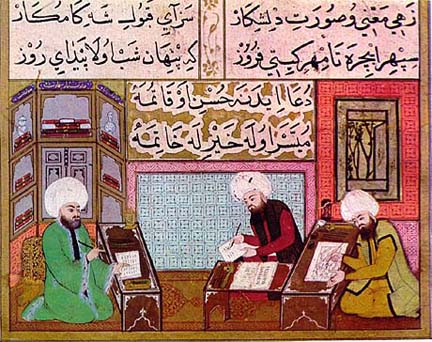
by Stefan Winter
There is a wealth of literature on Sunni-Shi’a relations relating to many periods and places of Islamic history. I attach a brief list of titles on the Mamluk and Ottoman cases with which I am familiar below.
Beyond that, however, there is probably a good reason why “this confrontation” and “its new relevance in today’s politics” is dealt more with in journalistic analyses than scholarly works. To link all instances of conflict or contact between given Sunni and Shi’a actors throughout Islamic time and space, from Pakistan to Lebanon, from Siffin to Doha, to a single ongoing confrontation, as modern observers often do, is reductionist at best.
Of course there is a fundamental theological dispute between Sunnism and Shiism and there has been no shortage of wars and communal disturbancesthat expressed themselves along sectarian lines. But such events invariably also had political and economic causes that must be investigated in their own specific context, and they should not mask the far more numerous instances when the supposed Sunni-Shii dichotomy explains absolutely nothing of, or is downright contradicted by, political events, from the Ayyubids’ tactical alliances with the Ismailis, to the Ottomans’ commercial relations with the Safavids and recourse to Shii tax farmers, to Iran’s intermittent support of Gülbuddin Hekmatiyar to the posters of Hasan Nasrallah you see all over the (conservative Sunni) suq in Aleppo today.
It seems there’s always an “expert” or a “specialist” on TV who will relate any bomb that goes off in Baghdad straight back to what “began” in 632, but to do so is to ignore a millenium and a half of history that will not fit a teleological narrative.
References on Sunni-Shi’a relations in Mamluk and Ottoman contexts
Abu-Husayn, Abdul-Rahim. “The Shiites in Lebanon and the Ottomans in the 16th and 17th Centuries” in La Shi’a nell’Impero Ottomano (Rome: Accademia Nazionale dei Lincei, 1993), 107-19.
Akyol, Taha. Osmanlı’da ve Iran’da Mezhep ve Devlet (Istanbul: Milliyet Yayınları, 1999).
Allouche, Adel. The Origins and Development of the Ottoman-Safavid Conflict (906-962/1500-1555) (Berlin: Klaus Schwarz, 1983).
Eberhard, Elke. Osmanische Polemik gegen die Safawiden im 16. Jahrhundert nach arabischen Handschriften (Freiburg i.Br.: Klaus Schwarz, 1970).
Kawtharani, Wajih. Al-Faqih wa’l-Sultan (Beirut: Dar al-Rashid, 1989).
Mordtmann, J. H. “Sunnitisch-schiitische Polemik im 17. Jahrhundert,” Mitteilungen des Seminars für orientalische Sprachen an der Friedrich-Wilhelms-Universität zu Berlin; 2. Abteilung (westasiatische Sprachen) 29 (1926), 112-129.
Nakash, Yitzhak. The Shi’is of Iraq (Princeton University Press, 1994).
Newman, Andrew. “The Myth of the Clerical Migration to Iran. Arab Shiite Opposition to ‘Ali al-Karaki and Safawid Shiism” in Die Welt des Islams 33 (1993), 66-112.
Öz, Baki. Aleviğin Tarihsel Konumu (Istanbul: Der Yayınları, 1995).
Sabbagh, ‘Abbas Isma’il. Tarikh al-‘Alaqat al-‘Uthmaniyya al-Iraniyya: al-Harb wa’l-Salam bayna ‘l-‘Uthmaniyyin wa’l-Safawiyyin (Beirut: Dar al-Nafa’is, 1999).
Salati, Marco. Ascesa e caduta di una famiglia di Asraf sciiti di Aleppo: I Zuhrawi o Zuhra-zada (1600-1700) (Rome: Istituto per l’Oriente C.A. Nallino, 1992).
——. “Toleration, Persecution and Local Realities: Observations on the Shiism in the Holy Places and the Bilad al-Sham (16th-17th Centuries)” in coll., La Shi’a nell’Impero Ottomano (Rome: Accademia Nazionale dei Lincei, 1993), 123-132.
Sohrweide, Hanna. “Der Sieg der Safaviden in Persien und seine Rückwirkung auf die Schiiten Anatoliens im 16. Jahrhundert,” Der Islam 41 (1965), 95-223.
Stewart, Devin. “Notes on the Migration of ‘Amili Scholars to Safavid Iran,” Journal of Near Eastern Studies 55 (1996), 81-103.
Winter, Stefan. “Shams al-Din Muhammad ibn Makki ‘al-Shahid al-Awwal’ (d. 1384) and the Shi’a of Syria,” Mamluk Studies Review 3 (1999),159-182.
——. The Shiites of Lebanon under Ottoman Rule, 1516-1788 (Cambridge University Press, 2010).
Zarinebaf-Shahr, Fariba. “Qizilbash ‘Heresy’ and Rebellion in Ottoman Anatolia during the Sixteenth Century,” Anatolia Moderna 7 (1997), 1-15.
Stefan Winter is Professeur, Histoire du Proche-Orient et du Maghreb Université du Québec
à Montréal http://www.proche-orient.uqam.ca